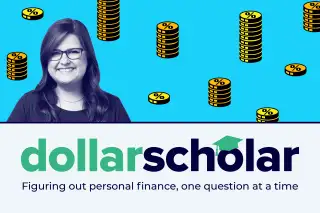Dollar Scholar Asks: What Does the Fed Interest Rate Hike Mean for Me?

This is an excerpt from Dollar Scholar, the Money newsletter where news editor Julia Glum teaches you the modern money lessons you NEED to know. Don't miss the next issue! Sign up at money.com/subscribe and join our community of 160,000+ Scholars.
Tired of everything costing so much? Me, too. But help is on the way.
The Federal Reserve made good on its promises Wednesday and announced its first rate hike since 2018 in an attempt to tamp down record-high inflation rates in the U.S. The target range for the federal funds rate — aka the rate at which banks lend money to each other — is set to increase by 0.25%.
This is just the first step for the Fed, which said in a statement it "anticipates that ongoing increases in the target range will be appropriate." In a news conference, Fed Chairman Jerome Powell predicted inflation will begin to come down in the second half of the year.
This is a lot of jargon, but it does have the potential to impact the wallets of everyday Americans like yours truly. So let's parse it.
What does the Fed raising interest rates mean for me?
First, some background.
According to its website, the Fed has five functions, all to “promote the effective operation of the U.S. economy and, more generally, to serve the public interest.” Ideally, it wants low, stable inflation that averages out to 2% in the long run and low unemployment. To achieve that, it can use levers like the federal funds rate.
We’ve been in a low interest-rate environment for a while. The last rate hike was years ago, and as the pandemic got underway in spring 2020 the Fed slashed rates to essentially zero.
The implication of that was “the cost of borrowing — whether that’s student loans, mortgages, car loans or even, to some extent, credit cards — has been substantially cheaper than is the historic norm for some time now,” says Christopher Jones, chief investment officer at Edelman Financial Engines.
In the meantime, the economy has recovered. Like, really recovered: The labor market is extremely tight, and inflation was at 7.9% as of February, a 40-year high. As a result, Jones says, “the Fed has made it pretty clear that the days of zero interest rates are numbered.”
Powell said at a news conference in January that the committee was prepared to “move steadily away from the very highly accommodative policies we put in place during the challenging economic conditions that the economy faced earlier in the pandemic.” He all but confirmed a series of rate hikes was coming, even as Russia's invasion of Ukraine rattled the forecast.
By hiking rates, the Fed will make borrowing more expensive for businesses and consumers like me, cooling down the economy and hopefully reducing inflation.
How should I react to the Fed rate hike?
Jones says credit card rates, adjustable-rate mortgages and such will “ratchet up in lock-step” with the Fed. As such, “it's a helpful time to take a look at where you're borrowing money and make sure that, to the degree you can, you shift away from things that [have] either higher rates of interest or things that are very sensitive to short-term interest rates,” he adds.
For example, I might want to refinance my mortgage. Or, if I have a fixed-rate mortgage where I’m paying a bit more than I need to each month, it might be smart to take that money and pay down credit card debt before the rates get too high. My cash will have a bigger impact that way.
(Speaking of my cash, one plus of rising interest rates is yields on my high-yield savings accounts should eventually go up, too.)
As far as investing goes, as a young person I should probably already have a majority of my long-term investments oriented toward equities (aka stocks) because I've got decades in the market and can afford to take risks. That's true now, as well: “To a large degree, equities provide the best long-term hedge against inflation,” Jones says.
As the Fed begins to increase interest rates, it’s crucial to remember to take a “no long-term bonds” stance, says Scott Eichler, a registered investment advisor in California. Bond prices move inversely to interest rates, so the higher interest rates go, the more prices fall.
“Often, keeping money is even more important than making money in rising interest-rate environments, so I would tell you long-term bonds are things people should avoid,” he adds. “Unless someone is absolutely freaked out by the stock market and bonds are the only things they could stomach, millennials really shouldn’t be looking at bond funds right now."
Eichler suggests looking for cash flow-positive businesses and value funds that will issue me dividends. Real estate could also be a good option in the form of real estate investment trusts, or REITs.
In all of this, I should remember that the normalization process will be slow and drawn-out. The Fed isn’t going 0 to 100 immediately. Hiking rates is going to take time, and so I have a while to adjust my strategies.
By raising rates, the Fed is poised to make borrowing more expensive. As a result, I may want to pay down high-interest credit card debt and make sure I’m properly invested in equities (not so much bonds).
I want to emphasize that nobody — except maybe JPow — knows what’s going to happen. But chances are this will be a long saga, and I don’t want to be reactionary. I’ve got a long-time horizon.
“If you’re the rare investor that can keep your emotions down, you're going to be successful,” Eichler says.
More from Money:
Dollar Scholar Asks: How Powerful Is Fed Chair Jerome Powell, Really?
What the Fed's Impending Rate Hikes Mean for Stocks, Crypto and More